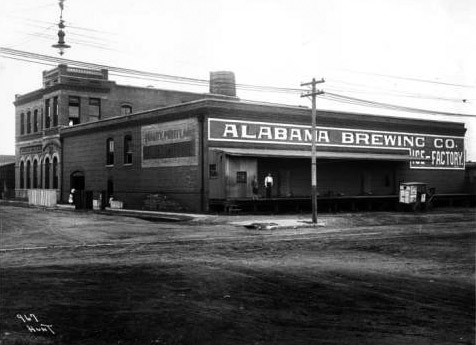Alabama Brewing Company: Difference between revisions
(New page: The '''Alabama Brewing Company''' was a brewery operated by Isadore Newman, Arthur Isnard and A. Cammack of New Orleans, Louisiana from 1897 until local prohibition was...) |
No edit summary |
||
| (4 intermediate revisions by the same user not shown) | |||
| Line 1: | Line 1: | ||
The '''Alabama Brewing Company''' was a brewery operated by [[Isadore Newman]], [[Arthur Isnard]] and [[A. Cammack]] of New Orleans, Louisiana from [[1897]] until local [[prohibition]] was enacted in [[1908]]. | [[File:Alabama Brewing Co.jpg|right|thumb|476px|Alabama Brewing Co.]] | ||
The '''Alabama Brewing Company''' was a brewery operated by [[Isadore Newman]], [[Arthur Isnard]] and [[A. Cammack]] of New Orleans, Louisiana from [[1897]] until local [[prohibition]] was enacted in [[1908]]. [[J. M. Wilzin]] was president of the company. | |||
The newly-formed business took over the idled brewery at [[22nd Street South|22nd Street]] and [[5th Avenue South|Avenue E]] operated by the [[Birmingham Brewing Company (1889)|Birmingham Brewing Company]], which went bankrupt during the [[Panic of 1893|financial panic]] of [[1893]]. The new owners invested $60,000 in repairs and equipment, including new boilers, filters and engines. A new 55'x88' 2-story bottling house was built, complete with a 35-ton ice machine. The head brewmaster, Valentin, oversaw the production of 5,000 barrels in the company's first full year. | The newly-formed business took over the idled brewery at [[22nd Street South|22nd Street]] and [[5th Avenue South|Avenue E]] operated by the [[Birmingham Brewing Company (1889)|Birmingham Brewing Company]], which went bankrupt during the [[Panic of 1893|financial panic]] of [[1893]]. The new owners invested $60,000 in repairs and equipment, including new boilers, filters and engines. A new 55'x88' 2-story bottling house was built, complete with a 35-ton ice machine. The head brewmaster, Valentin, oversaw the production of 5,000 barrels in the company's first full year. | ||
In [[1899]] a well-driller working on an expansion of the plant hit a seam of natural gas, which was tapped for use in the brewery. By [[1900]] the company had expanded with a cold-storage and ice plant in [[Gadsden]]. By [[1905]] | In [[1899]] a well-driller working on an expansion of the plant hit a seam of natural gas, which was tapped for use in the brewery. By [[1900]] the company had expanded with a cold-storage and ice plant in [[Gadsden]]. By [[1905]] the company was producing 40,000 barrels with over 100 workers on payroll during the busy brewing season. On [[January 4]], [[1906]] the company acquired additional property on [[Powell Avenue]] and engaged the firm of [[Wheelock, Joy & Wheelock]] to design a commercial building that could be leased to [[William Wise]] to operate a saloon. In April the company agreed to sell that property to investor Charles Whitaker of Davenport, Iowa with the provision that he lease it back to them for five years at $4,000 per year. The contract was amended to an option before it was executed on [[May 1]]. | ||
[[Jefferson County]] residents voted on [[October 28]], [[1907]] to enact a [[prohibition|local prohibition]] on alcohol sales. The brewery was given until [[May 28]] to dispose of its stock and ended up pouring 300 barrels into the street that day. | [[Jefferson County]] residents voted on [[October 28]], [[1907]] to enact a [[prohibition|local prohibition]] on alcohol sales. The brewery was given until [[May 28]] to dispose of its stock and ended up pouring 300 barrels into the street that day. The owners continued doing business as an ice manufacturer until [[1917]]. | ||
==References== | ==References== | ||
* Birmingham Beverage Company. (n. d.) "[http://www.alabev.com/history_of_brewing_in_alabama.htm The History of Brewing in Alabama]" | * Birmingham Beverage Company. (n. d.) "[http://www.alabev.com/history_of_brewing_in_alabama.htm The History of Brewing in Alabama]" | ||
[[Category: | [[Category:Former breweries]] | ||
[[Category:22nd Street South]] | [[Category:22nd Street South]] | ||
[[Category:5th Avenue South]] | [[Category:5th Avenue South]] | ||
[[Category:1897 establishments]] | [[Category:1897 establishments]] | ||
[[Category:1908 disestablishments]] | [[Category:1908 disestablishments]] | ||
[[Category:1917 disestablishments]] | |||
Latest revision as of 12:56, 19 September 2020
The Alabama Brewing Company was a brewery operated by Isadore Newman, Arthur Isnard and A. Cammack of New Orleans, Louisiana from 1897 until local prohibition was enacted in 1908. J. M. Wilzin was president of the company.
The newly-formed business took over the idled brewery at 22nd Street and Avenue E operated by the Birmingham Brewing Company, which went bankrupt during the financial panic of 1893. The new owners invested $60,000 in repairs and equipment, including new boilers, filters and engines. A new 55'x88' 2-story bottling house was built, complete with a 35-ton ice machine. The head brewmaster, Valentin, oversaw the production of 5,000 barrels in the company's first full year.
In 1899 a well-driller working on an expansion of the plant hit a seam of natural gas, which was tapped for use in the brewery. By 1900 the company had expanded with a cold-storage and ice plant in Gadsden. By 1905 the company was producing 40,000 barrels with over 100 workers on payroll during the busy brewing season. On January 4, 1906 the company acquired additional property on Powell Avenue and engaged the firm of Wheelock, Joy & Wheelock to design a commercial building that could be leased to William Wise to operate a saloon. In April the company agreed to sell that property to investor Charles Whitaker of Davenport, Iowa with the provision that he lease it back to them for five years at $4,000 per year. The contract was amended to an option before it was executed on May 1.
Jefferson County residents voted on October 28, 1907 to enact a local prohibition on alcohol sales. The brewery was given until May 28 to dispose of its stock and ended up pouring 300 barrels into the street that day. The owners continued doing business as an ice manufacturer until 1917.
References
- Birmingham Beverage Company. (n. d.) "The History of Brewing in Alabama"
